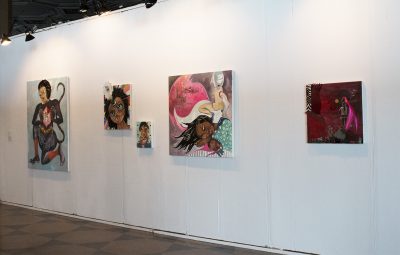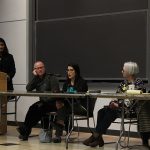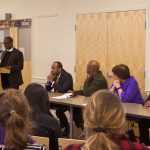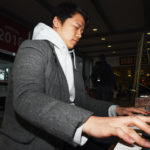
About 30 students and faculty gathered at Boston University’s 808 Gallery for an intimate discussion on feminism, specifically in academia.
Three different panels addressed a variety of topics ranging from gender and equity in higher education to the uses of archives and intersectional feminism.
The symposium was organized by the curators of “Occupancies,” an exhibition of 21 artists and two galleries on BU’s campus. The team of organizers consisted of BU Art Galleries’ staff and graduate students in BU’s Department of History of Art and Architecture.
The aim of the symposium, “Making Room: Practicing Feminisms Today,” was to “provide a much-needed platform for women’s advocacy and agency within our contested political climate,” Lynne Cooney, artistic director of BU Art Galleries, said before the panels began. The discussion would “address some of the discourses, debates and contestations around interpretations of feminisms today.”
The first panel, “Gender and Equity in Higher Education,” included professors and Ph.D students in both STEM and humanities fields. It was centered around discrepancies between men and women in higher education.
Participants talked about the biases of recommendation letters for students, networking and the importance of appropriate mentorship.
Jenna Tonn, a women, gender, and sexuality studies professor at Harvard University, said bias with recommendation letters was a problem in the late 19th century and continues to persist today.
BU History of Art and Architecture professor Alice Tseng stressed how important it is for professors to be aware of sexism when writing recommendation letters for students.
“I do take offense when I do read those letters from other advisors who, after talking about a student’s accomplishments, always ended the paragraph in ‘she’s so pleasant, and a pleasure to be with,’” Tseng said. “You don’t really see that with letters about male applicants.”
Jean Fan, a bioinformatics and integrative genomics Ph.D student at Harvard, talked about the gender divide in networking that occurs at conferences.
“Old men got together to go to the whiskey and smoke lounge,” Fan said. “[There is a] very clear divide that we [as women] didn’t have the opportunity to network with these older guys.”
Divya Israni, a BU biomedical engineering Ph.D student, discussed how mentorship is important in breaking gender biases such as what fields girls are told to go into.
“For a lot of girls, it’s from elementary school when they’re told you should go towards more of an art program or be creative or do this type of work rather than focusing on science or engineering,” Israni said. “It’s always important to have mentors educate you better than that and say that you are able to pursue these things.”
The second panel, “The Archival Body and the Feminist Voice,” focused on “how ideas of the radical archive and uses of counter-cultural archival material can create embodied sites where women’s activism and agency are given form and visibility,” Cooney said.
This panel consisted of archivists, a librarian and a writer. The speakers discussed how they use feminism and social activism in their respective careers.
Anna Clutterbuck-Cook, Massachusetts Historical Society reference librarian, talked about how she incorporates her definition of feminism into her work, especially following the 2016 election.
Dell Hamilton, an artist, writer, lecturer and participant in “Occupancies,” discussed performances she has done for audiences in the United States and abroad. She focuses on the way certain things such as gender and race are constructed in society.
“[Something] that I really like to have play out in my practice is to really believe what the [person] in charge does that we all sort of have individual agency,” she said. “We have an incredible opportunity I think to transform our country.”
Several professors and students who attended the discussion said they identified with some of the panelists’ own experiences.
Rachel Hofer, a second-year Ph.D. student in the BU Department of History of Art and Architecture, said she came to the panels because of her interest in academia.
“[I want to know] how you really navigate the situation, especially now that so much funding is being cut from departments, and they’re switching over to contract positions rather than tenure track,” she said. “I do think that gender issues come into that as well.”
BU African American Studies professor Maryanne Boelcskevy said she has gone through similar experiences some of the panelists spoke of.
“I’m interested in feminism, especially … [after] hearing the progress from the younger women’s point of view,” Boelcskevy said. “So I see some of the … challenges that I faced are very similar to what they’re facing.”
Christine Collins, a photography professor at Lesley University’s College of Art and Design, came with two of her colleagues to attend the discussions. They agreed that the subject matter was necessary for them to hear.
“The three of us felt like as a group, it would be an important event for us to go to,” Collins said. “I think that a lot of the topics that are being addressed today are really important for both women and men in academia to be thinking about.”




